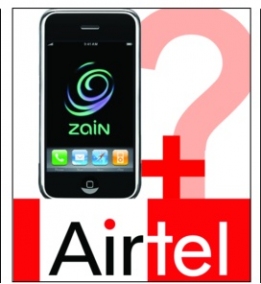African Odyssey - Will Bharti's Zain bid succeed?

-
Bidding $10.7 billion to buy most of the Kuwaiti telecom major Zain's African assets is Bharti Airtel's latest attempt to break into the African market. With growth in India's urban markets slackening and revenues taking a beating on account of cut-throat competition, entry into African markets holds promise, especially given the high population, lower mobile penetration and relatively less competition in the region.
Zain's board has given its in-principle approval. Mohamed Al Kharafi, head of the Kharafi Group and a key shareholder in the company, has announced to the international press that the board members are "very happy" with the price. For Bharti Airtel, it will all hinge on its exclusive talks with Zain (in effect till March 25). If all goes well, the deal should be wrapped up by mid-May, claim Bharti officials.
After two failed attempts to tie up with African operator MTN, clinching this deal is crucial for Bharti. It will allow the company to morph into a global emerging market player with a presence in 15 African countries and access to 42 million new users. In other words, if Bharti Airtel, with a market cap of $23.13 billion, does buy Zain's African operations, it will race past China Unicom, Sweden's TeliaSonera and Germany's T-Mobile to become the world's seventh largest mobile phone company in terms of subscriber numbers.
In January 2010, Bharti bought 70 per cent stake in Bangladesh's fourth largest operator Warid Telecom for $300 million. There were rumours that Bharti, which is looking to increase its global footprint, was open to further acquisitions in Bangladesh. However, according to analysts, Asian markets other than India have very low volumes compared to Africa. The continent has a population of 984.2 million and a teledensity of about 28 per cent. "Africa represents the most underpenetrated market in the world, offering a huge growth potential," notes Sunil Bharti Mittal, chairman and managing director, Bharti Airtel.
However, Bharti's investors have not shown the same level of optimism. They believe that the company is paying too high a price for Zain. Unlike MTN, which is a profitable company and a market leader in 20 of the 21 countries in Africa, Zain is a market leader in 12. Besides, the company has reported net losses of about $37 million in the nine months ended September 2009. According to analysts, if the market perceives that a transaction will put a load on the company's balance sheet, it will begin to worry. This is evident in the fact that Bharti's stocks have taken a near 12 per cent beating since the bid was announced in mid-February.
Investors also wonder how Bharti, if it clinches the deal, will turn around Zain, given that the company's decision to sell in the first place has been based on its struggle to generate profits in these markets. For Zain, of course, analysts say, offloading its operations, excluding those in Morocco and Sudan, is a strategic move that will help the company reduce its debt and focus more on the Middle East.
For Bharti, however, the ride will not be that easy. It will require time, management, effort and capital. Though the details of the transaction are still being worked out, it is clear that for the Bharti-Zain deal to go through, clearances will be required from 15 telecom regulators in countries where Zain is operational. Nigeria is already posing a problem. Soon after Zain backed Bharti's bid, Econet Wireless Holdings (Zain's partner in the Nigerian operations) withdrew, stating that Bharti could not access Zain's assets in Nigeria as Zain and Econet have been involved in an ownership-related dispute over Zain's Nigerian arm for several years.
The other concern for Bharti is putting a near $9 billion debt on its balance sheet. At end-December 2009, Bharti's net debt was about 0.1 times its equity and the company had cash reserves of nearly Rs 76 billion. However, post the deal, which is to be funded mostly through borrowings, the company can expect a heavy debt burden.
Bharti officials concede that the deal will have an unspecified impact on earnings. But that would only be in the short term. "We have very carefully evaluated the financial aspect of the deal as well as the valuation, which is fair and reasonable. The financial impact will be well within the accepted and prudential norms, even if fully funded by debt," says Akhil Gupta, deputy group CEO of Bharti Enterprises. The strain on the balance sheet apart, Bharti is looking to become a global player with this acquisition. It needs to diversify and there are not too many assets up for sale at the moment. With MTN and Vodacom being the only major players in Africa apart from Zain, Bharti has limited choice, especially as it has tried its luck with MTN unsuccessfully in the past.
All in all, the deal, if clinched, will be a feather in Bharti's cap. And according to analysts, Bharti can make a success of it by leveraging its popular "minutes factory" business plan, which is a low-cost, high volume model. Romal Shetty, head of Indian telecom with global consultancy KPMG, concurs with this view. "Being a pioneer of the low-cost, outsourced model of operations, Bharti can replicate it in Africa, where market conditions are similar."
- Most Viewed
- Most Rated
- Most Shared
- Related Articles
- Manufacturing Hub: India emerges as a ke...
- TRAI performance indicator report for Se...
- Prashant Singhal, partner, telecom indus...
- 2G spectrum scam: continuing controversy
- An Eventful Year: Telecom highlights of ...
- Telecom Round Table: TRAI’s spectrum p...
- Manufacturing Hub: TRAI recommends indig...
- Linking Up: ITIL to merge with Ascend
- High Speed VAS - Killer applications w...
- Bharti Airtel seals deal with Zain - Zai...






